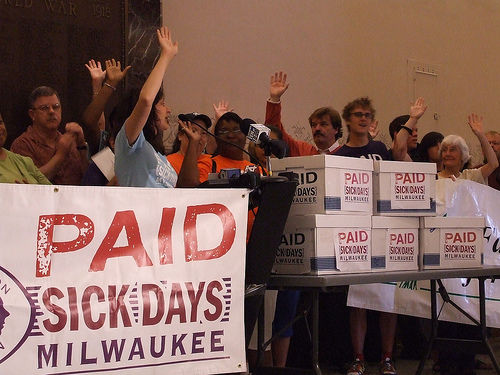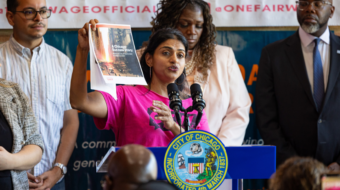
I’m always a sucker for certain headlines at the grocery store check out line. “Finding the right balance between work and family” is one of them. I leaf through the magazine pages searching for solutions. What tips can the wise editors give a working mom like me on how to keep getting a paycheck by working 40-50 hours a week, while making a decent home life for my two kids and husband? What’s the secret?
As it turns out, the secret is … politics. It’s not just about me and my family. Nope. It’s about millions of families searching for the same thing. Which means it’s in the structure of society, and to change it leads you to politics.
Americans work longer hours than workers in Japan and most European countries, according to a new report, “The Three Faces of Work-Family Conflict.” The typical middle-income family works 11 hours more per week in 2006 than it did in 1979, the report authors Joan Williams and Heather Boushey say. More hours at work inevitably leads to fewer hours with family. The report puts work-family conflict at a much higher rate than elsewhere in the industrially-developed world, 90 percent of American mothers and 95 percent of American fathers say they have work-family conflict in their lives.
According to a Monster.com survey five years ago, 81 percent of the respondents said they were unhappy with their work/life balance. In the U.S., eighty percent of married couples are dual income earners. That’s a lot of unhappiness.
According to “The Three Faces” report Americans lack less family-support laws than the rest of the industrially-developed world. So in France, for example, there are paid maternity-leave laws and paid sick days.
Plus, in France and other countries, child care is subsidized, thereby making it more affordable and better quality.
The report looks at families and moms across the income spectrum from professional/upper income women to middle income (they call the missing middle, some 50 percent of the workforce, which has not been studied) to poor women. The authors say each category experiences the family-work conflict, but they experience it differently.
And it’s those differences that weaken a potential political coalition that could win more family-friendly laws, the authors say.
But, the report states, each group needs “four basic kinds of supports and protections”:
• Short-term and extended leaves from work, including paid time off for family and medical leave and paid sick days.
• Workplace flexibility to allow families to plan their work lives and their family lives.
• High-quality and affordable childcare so that breadwinners can concentrate on work at work, and
• Freedom from discrimination based on family responsibilities.
The report, a collaboration between Center for American Progress and the Center for WorkLife Law at the UC Hastings College of the Law, urges progressives to build a coalition that can attract poor, professional and middle-income women despite the tensions and differences in needs between the groups.
Seems that high-quality and affordable childcare is key to any family-friendly policies, and perhaps economic growth. I remember hearing the stories about the 1940s, and when the U.S. entered WWII. Men, by the droves, entered the armed forces and women went into the factories to fill the labor shortage. Almost overnight, I was told, the government got day care centers up and running for these working women, the “We Can Do It” generation. And after the war, almost overnight, policies changed. Except for a brief period in the 1960s and programs like Head Start, or in 1993 with the passage of the Family and Medical Leave Act, childcare has not been on the political agenda of this nation. So much for the much lauded “family values” rhetoric.
This report comes out at a time when a union, civil rights, community coalition is forming to demand massive job creation. Affordable and high quality child care and attention to the needs of families could help broaden and deepen the reach of this budding movement, and possibly help unite the three faces of family work conflict.
Photo: Milwaukee workers demand paid sick days. http://www.flickr.com/photos/vocesdelafrontera/ / CC BY 2.0










